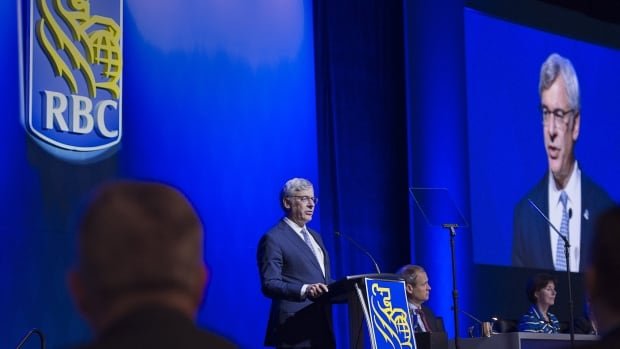Representatives from Canada’s five biggest banks will face questions from MPs this afternoon over their commitments to help reduce greenhouse gas emissions and spur the transition to renewable forms of energy.
The chief executives of RBC, CIBC, TD Bank, BMO and Scotiabank will appear before the standing committee on environment and sustainable development, starting at 3:30 p.m. ET. All five will appear by video conference.
Canadian banks have come under criticism for how their lending practices contribute to climate change, given that they are among the largest financiers of oil, gas and coal globally. A recent report calculated that Canada’s top banks pumped a combined $103.85 billion US into fossil fuel projects in 2023.
The five largest banks have made both short- and long-term emissions reduction targets, including net-zero financed emissions by 2050, but have also been criticized for not moving fast enough.
Another recent report, from InfluenceMap, a global climate policy watchdog, found that Canada’s largest five banks have not aligned “their short- and medium-term emissions reduction targets with their long-term net zero commitments.”
“All five banks have set 2030 interim targets for the oil, gas, and power sectors among other sector targets. However, these are almost all relative, intensity-based targets, allowing for absolute financed emissions to rise.”
Today’s testimony comes a week after the same committee questioned the CEOs of Canada’s top oil and gas producers over their climate commitments.
New rules for banks?
Independent Quebec Sen. Rosa Galvez has proposed a bill, known as the Climate-Aligned Finance Act, that would impose new rules on Canadian financial institutions to align them with the country’s climate goal.
The bill was tabled more than two years ago, but it remains at the committee stage in the Senate. It faces several more hurdles before it would be put to a vote in the Senate, and then make its way to the House of Commons.
The Canadian Bankers Association (CBA), which represents the country’s largest banks, is opposed to the legislation, saying it would add unnecessary regulations on the sector.
“Canada’s banks understand the important role that the financial sector can play in facilitating an orderly transition to a low-carbon future,” Maggie Cheung, a CBA spokesperson, told CBC News recently.
“This includes working with clients across industries to help them decarbonize and pursue energy transition opportunities, and financing new and existing green projects that will help Canada meet its net-zero ambitions.”
Julie Segal, a climate finance specialist with the advocacy group Environmental Defence, said Thursday the banks’ “voluntary climate commitments have proven fickle,” and more regulations are “direly needed.”
“We need credible climate transition plans from these banks and financial institutions, and since they are not designing these on their own, we need rules to ensure they happen and are delivered.”

Leave a Reply